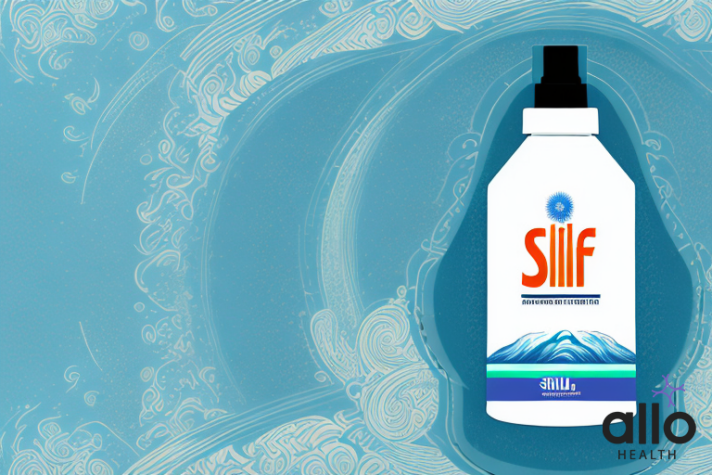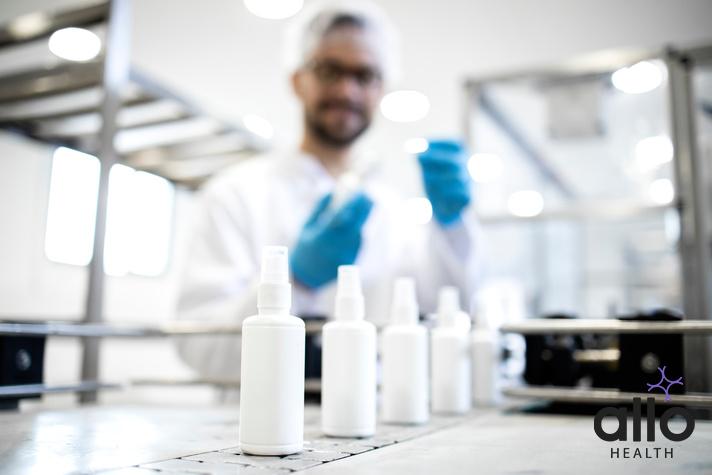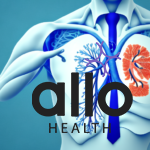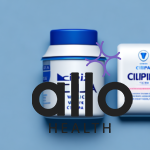Exploring The Benefits Of Sildenafil Spray in India

Allo Health is dedicated to personalized well-being, offering support and trusted information tailored to individual health goals. The platform emphasizes human-generated content, led by a distinguished medical team of experts, including physicians and sexual health specialists. Their commitment to credibility involves rigorous fact-checking, authoritative research, and continuous updates to ensure accurate, up-to-date information. Allo Health's unique approach goes beyond conventional platforms, providing expert-led insights and a continuous commitment to excellence, with user feedback playing a crucial role in shaping the platform's authoritative voice.

Dr.Sushma.V completed MBBS degree from BGS GIMS,bangalore
Why This Was Upated?
Our experts continually monitor the health and wellness space, and we update our articles when new information became available.
Updated on 02 June, 2024
- Article was updated as part of our commitment to diversity, equity, and inclusion.

"The following blog article provides information about a drug or brand name drug and its potential effects or benefits. However, it is crucial to understand that this information is intended for general educational purposes only and should not be considered a substitute for professional medical consultation. It is highly recommended to consult with a qualified healthcare professional before making any decisions regarding medication, treatment, or healthcare management.
Book consultation
Individuals have unique medical conditions, and the information provided in this article may not be applicable to everyone. Only a qualified healthcare provider can evaluate your specific medical situation, taking into account your medical history, conducting appropriate tests, and providing personalized advice and recommendations. They are equipped to make informed decisions tailored to your individual needs.
It is crucial to emphasize that self-diagnosis, self-medication, or disregarding medical advice can have serious health consequences. This article may reference specific brand names or drugs for illustrative purposes. Mention of these names does not imply endorsement, recommendation, or guarantee of their efficacy or safety. The choice of medication should be based on discussions and individualized guidance from a healthcare professional who has a comprehensive understanding of your medical condition.
"It is no secret that erectile dysfunction (ED) can be a distressing and frustrating experience for men. This condition affects millions around the world and is often associated with feelings of anxiety, low self-esteem, and a host of other psychological and emotional concerns. Fortunately, there are many treatments available to help manage this condition, and one of the most popular options is sildenafil spray.
What Is Sildenafil Spray?
Sildenafil spray is a pharmaceutical product designed to address erectile dysfunction (ED) in men. It contains sildenafil citrate, a potent vasodilator classified as a phosphodiesterase type 5 (PDE5) inhibitor. The primary purpose of sildenafil spray is to enhance blood flow to the penile tissues, facilitating the achievement and maintenance of an erection during sexual stimulation.
The mechanism of action involves inhibiting the PDE5 enzyme, which is responsible for the degradation of cyclic guanosine monophosphate (cGMP) in the smooth muscle cells of the penile arteries. By blocking PDE5, sildenafil allows cGMP to accumulate, promoting relaxation of the smooth muscles and vasodilation. This increased blood flow to the penis results in improved erectile function.
One distinguishing feature of sildenafil spray is its mode of administration. Unlike traditional oral tablets, sildenafil spray is applied topically to the penile region. This direct application offers several advantages, including faster absorption through the skin, potentially quicker onset of action and reduced systemic exposure compared to oral forms.
To use sildenafil spray, individuals typically apply a specific number of sprays directly onto the penis shortly before anticipated sexual activity. The dosage may vary, and it is crucial to follow the instructions provided by the healthcare provider or outlined on the product label. Do not to exceed the recommended dosage to avoid potential adverse effects.
Sildenafil spray has gained popularity due to its convenience, discretion, and potential benefits for those who may have difficulty with oral medications. As with any medication, there are considerations and potential side effects. It is essential for individuals to consult with their healthcare provider before using sildenafil spray, especially if they have underlying medical conditions or are taking other medications, to ensure its safety and efficacy for their specific situation.
Sildenafil Uses & Benefits
Sildenafil is a medication primarily used to treat erectile dysfunction (ED) in men, and it has been a revolutionary option since its introduction. Here are detailed explanations of its uses and benefits:
- Treatment of Erectile Dysfunction (ED): Sildenafil is most widely known for its effectiveness in treating ED. It helps men who struggle to achieve or maintain an erection by increasing blood flow to the penis during sexual arousal. This enhances the physiological response to sexual stimulation, allowing for a satisfactory sexual experience.
- Pulmonary Arterial Hypertension (PAH): Apart from its well-known use in ED, sildenafil is also employed in the treatment of pulmonary arterial hypertension (PAH). In this condition, the blood pressure in the arteries that supply the lungs becomes elevated. Sildenafil’s vasodilatory effects help relax the pulmonary arteries, reducing resistance and pressure, ultimately improving exercise capacity in individuals with PAH.
- Raynaud’s Phenomenon: Sildenafil has demonstrated efficacy in managing symptoms of Raynaud’s phenomenon, a condition characterized by reduced blood flow to certain parts of the body, typically the fingers and toes. By promoting vasodilation, sildenafil can alleviate the frequency and severity of Raynaud’s attacks.
- Altitude Sickness: Some studies suggest that sildenafil may be beneficial in preventing and treating altitude sickness. Its ability to dilate blood vessels may help improve blood flow in low-oxygen environments, reducing symptoms such as headache and nausea associated with high altitudes.
- Potential Cardiovascular Benefits: Beyond its primary uses, sildenafil has been explored for potential cardiovascular benefits. Research indicates that it may have positive effects on the heart, including improving exercise capacity and cardiac function. But, further studies are needed to establish these potential benefits conclusively.
While sildenafil offers significant therapeutic benefits, it is not without potential side effects. Individuals considering the use of sildenafil should consult with their healthcare provider, especially if they have pre-existing medical conditions or are taking other medications, to ensure safe and appropriate usage tailored to their specific health profile.

Sildenafil Side Effects & Precautions
Sildenafil Side Effects:
- Common Side Effects: Common side effects of sildenafil include headaches, facial flushing, and nasal congestion. These effects are often mild, temporary, and diminish as the body adjusts to the medication.
- Digestive System Concerns: Some individuals may experience gastrointestinal concerns such as indigestion or upset stomach. Taking sildenafil with food may help alleviate these symptoms.
- Visual Disturbances: Sildenafil may cause temporary changes in vision, such as blurred vision, sensitivity to light, or a blue-green tinge. These effects are generally mild and reversible.
- Muscle Aches and Back Pain: Muscle aches and back pain have been reported by some users. These symptoms are typically transient and resolve without intervention.
- Priapism: Priapism, a prolonged and painful erection lasting more than four hours, is a rare but serious side effect. Immediate medical attention is required to prevent potential damage to the penis.
- Hearing Loss: While extremely rare, sudden hearing loss has been reported in some individuals using sildenafil. If any sudden hearing impairment occurs, seek prompt medical attention.
- Allergic Reactions: Allergic reactions to sildenafil are rare but can include symptoms like rash, itching, swelling, severe dizziness, or difficulty breathing. Seek immediate medical attention if any signs of an allergic reaction occur.
Precautions:
- Medical History Disclosure: Inform your healthcare provider of your complete medical history, including any cardiovascular concerns, kidney or liver concerns, bleeding disorders, or previous instances of priapism.
- Medication Interactions: Sildenafil may interact with certain medications, especially those containing nitrates. Inform your healthcare provider of all prescription and non-prescription medications, including herbal supplements, to avoid potential interactions.
- Cardiovascular Risks: Individuals with pre-existing cardiovascular conditions should use sildenafil with caution. Seek medical advice if you have a history of heart attack, stroke, or irregular heartbeats.
- Avoid Alcohol and Grapefruit Juice: Limit alcohol intake while using sildenafil, as excessive alcohol consumption may increase the risk of side effects. Additionally, grapefruit juice can interfere with sildenafil absorption and should be avoided.
- Seek Professional Guidance: Only use sildenafil under the supervision of a qualified healthcare professional. It is not intended for recreational use, and self-medication can lead to adverse effects.
Understanding and adhering to these precautions can help ensure the safe and effective use of sildenafil, minimizing the risk of potential side effects. Always consult with a healthcare provider for personalized guidance based on individual health conditions and needs.
Sildenafil Drug Interactions
- Nitrates: Sildenafil has a significant interaction with nitrates, commonly prescribed for chest pain. Concurrent use can lead to a dangerous drop in blood pressure. It is crucial to avoid combining sildenafil with nitrate medications, including nitroglycerin, isosorbide mononitrate, and isosorbide dinitrate.
- Alpha-Blockers: Alpha-blockers, prescribed for conditions like benign prostatic hyperplasia (BPH) or hypertension, can enhance the blood pressure-lowering effects of sildenafil. Adjustments in dosage may be necessary under medical supervision to prevent hypotension.
- Antihypertensive Medications: Sildenafil can potentiate the hypotensive effects of antihypertensive medications. Close monitoring is advised, and dosage adjustments may be necessary, especially in individuals taking multiple antihypertensive drugs.
- Protease Inhibitors (HIV Medications): Protease inhibitors, used in the treatment of HIV, can increase sildenafil levels in the blood. This can amplify the risk of sildenafil-related side effects. Careful monitoring and potential dosage adjustments are recommended.
- Erythromycin and Clarithromycin: Macrolide antibiotics like erythromycin and clarithromycin may increase sildenafil levels, leading to a higher risk of side effects. A healthcare provider may need to adjust the sildenafil dosage if these antibiotics are prescribed.
- CYP3A4 Inhibitors: Medications that inhibit the CYP3A4 enzyme, such as ketoconazole, itraconazole, and ritonavir, can increase sildenafil levels. This may heighten the risk of side effects, and dosage adjustments might be necessary.
- Rifampin: Rifampin, an antibiotic used to treat tuberculosis, may decrease sildenafil levels in the blood. This could potentially reduce the effectiveness of sildenafil, and a healthcare provider may consider adjusting the dosage.
- Grapefruit Juice: Grapefruit juice can inhibit the enzyme responsible for breaking down sildenafil, leading to increased levels in the blood. This can enhance the risk of side effects, and consumption of grapefruit products should be limited while using sildenafil.
- Other Erectile Dysfunction Medications: Combining sildenafil with other medications for erectile dysfunction, such as tadalafil or vardenafil, is generally not recommended. This may increase the risk of adverse effects and should only be done under the guidance of a healthcare professional.
- Recreational Drugs (Poppers): Recreational drugs containing nitrites, often referred to as “poppers,” can cause a dangerous interaction with sildenafil, leading to a sudden and severe drop in blood pressure.
It is crucial to inform healthcare providers about all medications, including over-the-counter drugs, herbal supplements, and recreational substances, to ensure safe and effective use of sildenafil without compromising health or exacerbating potential risks. Always consult with a healthcare professional for personalized advice based on individual health conditions and medications.
Most Asked Questions
-
What is sildenafil spray and how does it work?
Sildenafil spray in India is a medication used to treat erectile dysfunction. It contains sildenafil, a phosphodiesterase type 5 (PDE5) inhibitor. This drug works by relaxing the muscles in the blood vessels, allowing increased blood flow to the penis, which helps achieve and maintain an erection.
-
How is sildenafil spray different from traditional oral tablets?
Sildenafil spray offers a convenient alternative to traditional oral tablets. It is administered topically and absorbed directly through the skin, providing a faster onset of action compared to oral forms. This method can also minimize side effects and offer more precise dosage control.
-
What is the recommended dosage and usage of sildenafil spray?
The recommended dosage of sildenafil spray varies, but generally, a few sprays are applied directly to the penile region before sexual activity. It is crucial to follow the instructions provided by the healthcare provider or on the product label. Avoid exceeding the recommended dosage to prevent potential adverse effects.
-
Are there any side effects associated with sildenafil spray?
Common side effects of sildenafil spray may include headaches, flushing, and nasal congestion. These effects are often mild and temporary. But, if more severe side effects like prolonged erections or vision changes occur, seek medical attention promptly. It is crucial to inform the healthcare provider about any pre-existing conditions or medications to avoid potential interactions.
-
Is sildenafil spray suitable for everyone, and are there any contraindications?
While sildenafil spray is generally safe for most individuals, it may not be suitable for those with certain medical conditions or taking specific medications. Individuals with cardiovascular concerns, liver or kidney concerns, or those on nitrate medications should consult their healthcare provider before using sildenafil spray. Always disclose your complete medical history to ensure safe and effective usage.






































